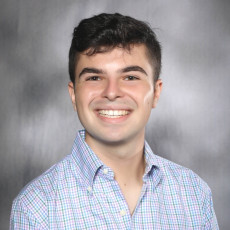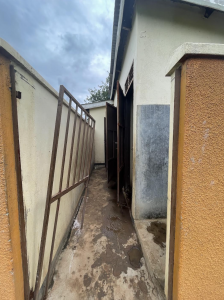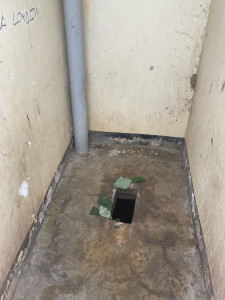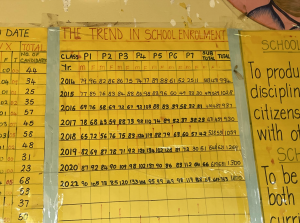While Awach P7 has received extensive renovations as well as the current construction of a on-site health clinic for students, the toilets have not received the same care. Students are consistently faced with a horrific stench when they enter the toilets. As they continue to enter the stall, they notice feces smeared across the walls, a door barely clinging on, and maggots seeping out of the toilets. The fear, disgust, and embarrassment kick in as they contemplate using the bathroom in public or under these conditions, no choice seeming more appealing than the other. That is what the students at Awach P7 face daily.
During my first visit to Awach P7, the majority of the time was spent with Joyce, the head teacher. We visited the boys and girls toilets only briefly, rather, tackling the logistics of the school such as enrollment, need, and number of students with disabilities within her office.
On my second visit to the school, I was able further examine the toilets and the existing conditions that were breeding grounds for diseases. As we conducted our interviews with the teachers and evaluated the student-to-toilet ratio, we realized the toilet disparity and lack of proper sanitation was a real barrier for these students.
At Awach P7 there are 10 stances, 5 for the girls, and 5 for the boys. The extenuating conditions of the toilets has created an environment where the boys find it easier to pee in public than to enter the stalls— leaves, stones, and the walls serving as their primary form of toilet paper gave an insight into the lack of a bathroom system in this school. For the girls, the conditions were exacerbated as it is much more difficult for them to use the bathroom outside of the stalls creating large wait times across the school to enter the toilets. During their menstrual cycles, the girls have no room to change their clothes or change their pads. There is a pile of used pads outside the girl’s bathroom that the administration burns weekly adding to the embarrassment of simply using the restroom. Because of this, in addition, the project is tackling a new changing room for the girls to assist them when needing to change or during their menstruation cycle.
The deliverables for this project were broken down into 3 main sectors: sanitation and containing the spread of disease, accessibility, and creating a safe environment for students to be able to use the bathroom.
One we confirmed with Joyce that Awach P7 had been selected for the construction of our Wash Project, we conducted a full investigation, took photos, and observed the nature of the toilets during our time there. One of the doors had caved in, toilets were blocked and unusable, and maggots were crawling in and out of the toilets making it impossible to use these facilities. Many students would rather dispose of their feces outside the toilets because of the intense conditions. After seeing the worse-than-expected conditions, I reported back to AP and evaluated the budget with Iain and Delaney.
After vouching on behalf of the school that the need of renovating the existing toilets was greatly needed, AP was able to pull together an additional $5,000, bringing our total investment into toilets at Awach at $15,000. All in all, we with the increase in the budget, we’re able to distribute soap and toilet paper, renovate the 10 existing toilets, and have a grander handover ceremony which will be unforgettable.
Increased enrollment is something the school is tackling and an expansion of a bathroom system that is accessible to all the student population is of the utmost importance. Pressure and pride should not be factors that students have to consider when relieving themselves— GDPU and AP are changing this.
Posted By Kyle Aloof
Posted Jul 15th, 2022





1 Comment
Iain Guest
July 17, 2022
Kyle – thanks for this very thorough and graphic description of the WASH challenge at Awach. It’s great to be able to pick up this important program after three years of lock-down.